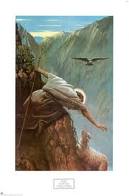Luke 17.11-19Â Â A study on the text
Â
 Today we are going to do something a little different. Sometimes it is good to do some ‘theology’; today you will be theologians. It means the study of God through the study of his word.
Today we are going to do something a little different. Sometimes it is good to do some ‘theology’; today you will be theologians. It means the study of God through the study of his word.
Luke begins with “Now on his way to Jerusalemâ€. This is very important for the understanding of the healing of the leper. Jesus was travelling, walking, or journeying towards Jerusalem. Does anyone know why? He was coming to the end of his ministry time on earth and Luke records how Jesus as now making his way to Jerusalem to be crucified; to be a sacrifice for the sins of the world.
The most important building is Jerusalem was what? The Temple. Every Jew knew that the Temple was where God dwelt. It was a holy place where the Levi priests and the high priest sacrificed birds and animals to atone for the sins of all the people.
Next Luke notes: “As he was going into a village, ten men who had leprosy met him. They stood at a distance.†and called out in a loud voice, “Jesus, Master, have pity on us!”
Using one of the dirty lamps, explain the purpose for the temple.
 The dirt on the glass represents sin or some form of disease, like leprosy which is ‘unclean’. In order to be healed or cleansed of sin, the person would go to the temple in Jerusalem.Â
God is holy – clean: Like this white cloth.Â
We are sinners, or sick, like this dirty lamp.
God in his holiness dwelt in the holy of holies.
The book of Leviticus is all about the cleanliness laws. How, through sacrifice and blood presented to God, the people of Israel are cleansed from un-cleanliness.
The priests would sacrifice a lamb, bring the blood of the lamb into the holy of holies to be made clean, then brought out of God’s presence and sprinkled upon the sinner or unclean person to ‘make them clean again’ (wipe clean the glass)
If the person is healed the priest would announce this and welcome the person back into the community. If not, the person had to live in an ‘unclean’ colony outside of Jerusalem.
When Jesus sees the lepers, he knows they are unclean, like this second lamp. What does he do? Does he heal them? No, “When he saw them, he said, “Go, show yourselves to the priests.â€
Jesus is saying to go to the temple, to go where you are made clean because it is where God dwells in his holiness. The 10 lepers, by simply going, would be presuming that by going to the temple, going to where God dwells, he would cleanse them, and when they turn up to show the priests, cleansed, then receive the forgiveness of their sins.
Instead of this, something amazing happens on their way…what? They are cleansed “
What does this miracle tell us about Jesus?
Jesus is God in human flesh.
In Jesus, rather than in the temple is where God is found.
Use the second dirty lamp to demonstrate the healing of the leper.
By healing the 10 lepers, Jesus takes upon himself the sin and sickness of the lepers, like the blackness that is now on the white rag, but not on the glass.
How would you feel if your son, got his ‘Sunday whites’ and wiped clean dirty black lamps? Yes, you would be angry and would take the clothes and wash them clean to get rid of the dirt.
In the same way, God’s anger against the dirt of sin that now clung to Jesus, the blackness of sin for all people, rids the world of sin by having his Son crucified.
Jesus goes to the cross to die for our sin
He goes to the cross so that his blood atones for our sin
He goes to the cross to that by his blood we are cleansed
The healing of the lepers demonstrated before time, why Jesus was heading to Jerusalem. His death and the shedding of his blood now bring healing and cleansing, and not in the continual sacrifices of the temple.
What happened when Jesus died? The temple curtain, that separated God from humans, was torn in two. It no longer had any use, God no longer dwelt in the temple by in the man Jesus Christ.
The once for all sacrifice of Jesus, the blood of the Lamb of God, now cleanses.
Luke writes: “One of them, when he saw he was healed, came back, praising God in a loud voice. He threw himself at Jesus’ feet and thanked him– and he was a Samaritan.â€
The Samaritan recognised that God now dwelt in Jesus and thanked and praised him.
Jesus is still healing us
His very same way Jesus’ blood still cleanses us
His word pronounces us cleansed and his blood cleanses us.
This is why we must still confess that Jesus is truly present here for us, under the guise of the bread and wine. Only Jesus’ blood can cleans us of sin and make us clean, as St Paul urges us “For whenever you eat this bread and drink this cup, you proclaim the Lord’s death until he comes. Remembers, by his wounds we are healed!Â
Therefore, whoever eats the bread or drinks the cup of the Lord in an unworthy manner will be guilty of sinning against the body and blood of the Lord. A man ought to examine himself before he eats of the bread and drinks of the cup. For anyone who eats and drinks without recognizing the body of the Lord eats and drinks judgment on himself.â€
In the church, in the liturgy of the worship service, God cleanses us by the blood of his Son Jesus, and by the absolution of your sins, you are also made clean. We are lepers of sin who are made clean, like the cleaning of the lamp. So let us give thanks to God and praise him for our healing.








